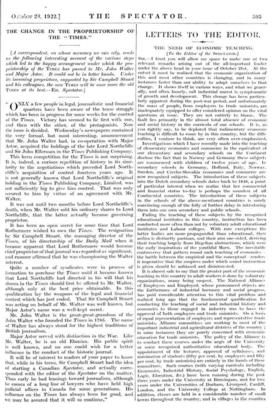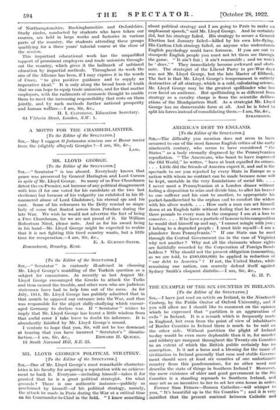LETTERS TO THE EDITOR.
THE NEED OF ECONOMIC TEACHING. [To the Editor of the SPECTATOR.] • Srn,—I trust you will allow me space to make one or two relevant remarks arising out of the all-important leader under the above head in your issue of October 21st. At the outset it must be realized that the economic organization of this and most other countries is changing, and in many instances faster than our ability to adapt ourselves to that change. It shows itself in various ways, and what we gener- ally, and often loosely, call industrial unrest is symptomatic of growth and development. This change has been particu- larly apparent during the post-war period, and unfortunately the mass of people, from employers to trade unionists, are inadequately equipped to offer considered opinion on the vital questions at issue. They are not entirely to blame. The fault lies primarily in the almost total absenc`c of economic and social history in the curricula of our schools. It is, as you rightly say, to be deplored that rudimentary economic teaching is difficult to come by in this country, but the diffi- culties, I venture to think, are very often over-emphasized.
Investigations which I have recently made into the teaching of elementary economics and commerce in the equivalent of our elementary and secondary schools on the Continent disclose the fact that in Norway and Germany these subjects arc commenced with children of twelve years of age. In secondary schools in Germany, Holland, Italy, Norway, Sweden, and Czecho-Slovakia economics and commerce are now recognized subjects. The introduction of these subjects into the Dutch secondary schools dates back to 1848, a point of particular interest when we realize that her commercial and financial status to-day is perhaps the soundest of all Continental countries. The introduction of these subjects in the schools of the above-mentioned countries is surely convincing enough of the folly of further delay in introducing them into our own secondary and public schools.
Failing the teaching of these subjects by the recognized
educational institutes in this country, instruction has been conducted more often than not by voluntary adult educational institutes and Labour colleges. With rare exceptions the latter bodies are more propagandist than educational, their milieu is distinctly partisan, and their aim one-sided, deriving their teaching largely from Hegelian abstractions, which were the early inspirations of the youthful Marx. The inevitable controversy that gathers round such teaching of economics— the battle between the empirical and the conceptual—renders it imperative that the auspices under which sound instruction is given should be unbiased and disinterested.
It is almost safe to say that the greater part of the economic
teaching in this country to adult workers is done by voluntary organizations, many being suspect. The National Alliance of Employers and Employed, whose pronounced objects are the furtherance of industrial harmony and social progress. has paid considerable attention to this vital problem and realized long ago that the fundamental qualification for conducting the teaching of social and industrial history and economics to those engaged in industry was to have the approval of both employers and trade unionists. On a basis of equal representation of employers and representative trade unionists, Alliance committees are working in most of the important industrial and agricultural districts of the country ; in some instances they are purely concerned with economic education for trade unionists. The policy of the Alliance is to conduct these courses under the aegis of the University or some recognized authoritative educational body. The appointment of the lecturer, approval of syllabuses, and nomination of students (fifty per cent. by employers and fifty per cent. by trade unionists) are entirely in the hands of these committees. Such courses (with varying curricula including Economics, Industrial History, Social Psychology, English, Logic, Elocution, &c.) have been running during the past three years under the University at Birmingam, and for two years under the Universities of Durham, Liverpool, Cardiff, London, and the University College at Nottingham. In addition, classes are held in a considerable number of small towns throughout the country, and in villages in the counties
of Northamptonshire, Buckinghamshire and Oxfordshire. Study circles, conducted by students who have taken our courses, arc held in large works and factories in various parts of the country, the students attending these groups qualifying for a three years' tutorial course at the close of the session.
This important educational work has the unqualified support of prominent employers and trade unionists through- out the country, which gives it the hallmark of unbiased education by impartial methods. Throughout its work the aim of the Alliance has been, if I may express it in the words of Croce, " to give positive guidance and to supply an imperative ideal." It is only along the broad basis of truth that we can hope to equip trade unionists, and for that matter employers, with the rudiments of economic thought to enable them to meet the increasing responsibility that rests on them jointly, and by such methods further national prosperity and human welfare.—I am, Sir, &e.,











































 Previous page
Previous page